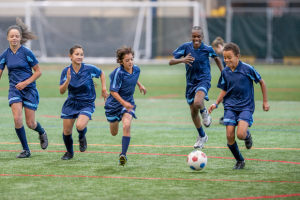
Concussions in sports are not a new concern, but the spotlight on these traumatic brain injuries has intensified in recent years, especially when it comes to teenagers participating in various athletic activities. As a parent to a child who participates in hockey, I know all the too well the risks. Recently, after he suffered a concussion, we followed the recommended protocol from our doctor but also looked at what else we could do to improve his recovery and diminish the risk in the future.
One supplement that has been getting a lot of research is omega-3 fatty acids, particularly, docosahexaenoic acid (DHA). This is because its role in the brain is to protect brain cells, decrease inflammation, and help to improve communication between nerve cells. However, this can only occur when the person is consuming the necessary quantity of omega-3s. When a concussion occurs, if the brain is deficient in omega-3 fatty acids, it is much harder for the brain to heal itself. Additionally, research has shown that after a concussion, there is a decreased amount of the omega-3 DHA in the brain tissue. Therefore, sufficient omega-3 intake is essential not only for normal brain function, but also for the brain in recovering from concussion.
Why Omega 3 is Needed in Concussions
Omega-3 docosahexaenoic acid (DHA) is a specific type of omega-3 fatty acid found in high concentrations in certain types of fish and fish oil supplements. It has been the subject of research interest due to its potential neuroprotective and anti-inflammatory properties, which may have relevance in the context of concussions and brain injury. Here's what we know about omega-3 DHA and concussions.
Anti-Inflammatory Effects
Omega-3 DHA has anti-inflammatory properties, and inflammation plays a role in the brain's response to injury, including concussions. Some studies have suggested that omega-3 DHA may help modulate the inflammatory response in the brain, potentially reducing the severity of inflammation after a concussion.
Neuroprotective Effects
Omega-3 DHA is a key component of cell membranes in the brain and may contribute to the structural integrity of neurons. It has been studied for its potential neuroprotective effects, which means it may help protect brain cells from damage, including that caused by traumatic brain injury.
Cognitive Function
Omega-3 DHA is also known for its role in supporting cognitive function. After a concussion, individuals may experience cognitive deficits, such as memory problems and difficulty concentrating. Some research has explored whether omega-3 DHA supplementation could help improve cognitive function during the recovery process.
Prevalence of Concussions in Teen Sports
Concussions are more prevalent among teenagers in sports than we might think. According to estimates, high school athletes in the United States alone sustain around 300,000 concussions each year.
High-contact sports like football, rugby, ice hockey, and soccer have consistently higher rates of concussions among teenagers. However, concussions can occur in almost any sport, including non-contact sports like cheerleading and gymnastics.
Recognizing the Signs and Symptoms
Early recognition of concussion symptoms is crucial for ensuring timely intervention. Some common signs and symptoms include:
- Headache
- Dizziness
- Nausea or vomiting
- Confusion
- Memory problems
- Slurred speech
- Sensitivity to light and noise
- Fatigue
Educating teenagers, parents, and coaches about these signs is essential. Often, athletes may not report their symptoms, fearing they'll be sidelined from play. Emphasizing the importance of reporting symptoms for their long-term health is crucial.
Preventing Concussions
While it's impossible to entirely eliminate the risk of concussions, preventive measures can significantly reduce the likelihood of injury.
Proper Equipment: Ensuring that athletes have access to well-fitting, high-quality safety equipment is paramount. Helmets, mouthguards, and headgear should be regularly inspected and maintained.
Training and Technique: Coaches should emphasize proper technique and safe playing strategies. Teaching athletes how to minimize the risk of head injuries through correct positioning and tackling techniques can make a significant difference.
Education: Comprehensive concussion education programs for athletes, coaches, and parents can enhance awareness and encourage early reporting of symptoms.
Managing Concussions
When a teenager sustains a concussion, the immediate response and subsequent management are critical:
Immediate Removal: If a concussion is suspected, the athlete must be removed from play immediately. Continuing to participate can lead to more severe injury.
Medical Evaluation: Consult a healthcare provider with experience in concussion management. They will perform necessary evaluations and guide the recovery process.
Rest and Recovery: Rest is crucial in the initial stages of concussion recovery. Both physical and cognitive rest, including limiting screen time and schoolwork, are essential.
Gradual Return to Play: Athletes should follow a gradual return-to-play protocol, which involves a step-wise progression through various levels of physical activity.
Concussions in teen sports are on the rise, but with the right awareness, prevention strategies, and management protocols, we can protect our young athletes. Safety should always come first. By working together, parents, coaches, and healthcare professionals can create a safer sporting environment where teenagers can pursue their passion for sports without compromising their long-term health.
Categories
Categories
Humanized Health - NEW!
Learn about personalized health from top experts! Check out our fascinating new shows every week, available as videos, podcasts and transcripts.:
Our Bloggers
-
 Paula Gallagher
Paula Gallagher
Paula is a highly qualified and experienced nutrition counselor on the staff at Village Green.
read more.. -
 Margo Gladding
Margo Gladding
Margo's impressive knowledge base is the result of a unique blend of educational and professional experience.
read more.. -
 Dr. Neal Barnard
Dr. Neal Barnard
Dr. Barnard leads programs advocating for preventive medicine, good nutrition, and higher ethical standards in research.
read more.. -
 Dr. Joseph Pizzorno
Dr. Joseph Pizzorno
Dr. Joseph Pizzorno, ND is a pioneer of integrative medicine and a leading authority on science-based natural medicine.
read more.. -
 Debi Silber
Debi Silber
Debi is a registered dietitian with a master’s degree in nutrition, a personal trainer, and whole health coach.
read more..
SEE ALL OF OUR BLOGGERS





